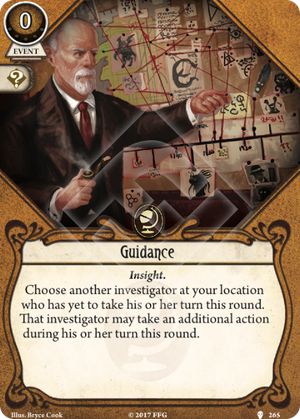
While this is a Seeker card and Seekers mainly have access to it, it is actually not really good for Seekers. And that is mainly because of the existance of Higher Education, but let's see it into it.
So, what kind of tests does a Seeker care about? A Seeker cares about 3 kinds of tests: An Intellect test, a Willpower test and an Agility test. Trying to pass an Intellect test means that you 're probably investigating, so buffing your stat with Quick Study is not helpful as you 're dropping a clue to get a clue. That doesn't make sense. Now, there are those cases where you 're trying to do something else on an Intellect test, like trying to beat this guy, or this ever-hateful thing, or trying to find the solution. In these cases popping Quick Study is good, but Higher Education does the same job just as good, if not better. On a Willpower and Agility test, Quick Study is also good, but the Willpower part is also covered by Higher Education.
That means, that, assuming you 're getting Higher Education, your only stat that is not covered is Agility. Are you going to spend 2-4 XP to get 1 or 2 copies of Quick Study to cover it? I don't think so, it's not worth it. If you care so much about evading an enemy, there are things that can cover this less costly, or more efficiently (not to mention that Ursula Downs doesn't need any of this) and Agility tests on treachery cards that happen every now and then can usually be covered by throwing a skill card or by cancelling them (if you 're Daisy Walker).
So, if Quick Study is not good for Seekers, whom is it actually good for?? The answer is that Quick Study is good for someone whose main job is to do something else, other than getting clues, and the only investigator whose main job is to do "something else" and has access to this card is Roland Banks.
And this is actually a great card for Roland! It opens up a whole new line of possibilities for him! First of all, it's a great way to deal with his signature weakness. Roland has a lot of difficulty dealing with Cover Up, when clues are not in accessible spots, or when he has to investigate a high-shroud location in order to deal with it. With this card, suddenly Cover Up becomes a lot less of a threat, as he can deal with it by picking a low-shroud location and popping Quick Study to place a clue on it and do his work. So, with this card, regardless of whether there clues on low-shroud locations or not, you can always deal with Cover Up by investigating those locations!!
Then, there are also other things to account for when Roland runs this card. Roland's .38 Special is a card that cares about having a clue on your location, and, with Quick Study, this card becomes a lot more than merely an upgraded .45 Automatic, as you can hit that +3 a lot more consistently (when you pop Quick Study it goes to +6!!) and other than, that there are also some Seeker cards that care about having a clue on your location. With Quick Study, Inquiring Mind becomes a great addition in a Roland deck and you might even consider Preposterous Sketches (i wouldn't suggest it though)!! Then, Shotgun becomes a viable choice as a late-game upgrade for him, as having tools like Quick Study and Inquiring Mind to buff it further can be pretty viable. Add in a Well Prepareds and Physical Trainings and there you have it: A Shotgun build for Roland!!
Another thing to note is that this card has a beautiful interaction with his special ability. When fighting an enemy and there are no clues on your location, or when you don't care as much about gathering clues, you can always pop Quick Study, drop a clue, then get the clue back after you kill the enemy, effectively netting a free +3 on an attack!!
So, to conclude, Quick Study is a card just for Roland so far. Hopefully, we will see more investigators in the future who can make good use of this card, but as of now, I don't think this card will be seeing a lot of play in non-Roland Banks decks.



